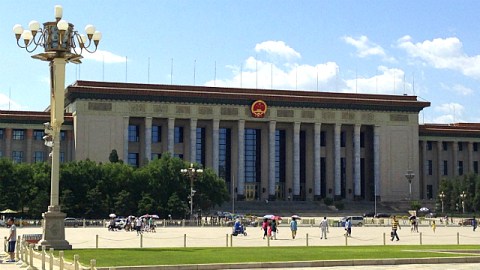No Quick Fix: Corruption in China

Rampant corruption causes headaches for China’s new leadership
“They are notorious for deceiving wherever they can. […] Their frauds are most astutely and craftily performed, so that Europeans have to be painfully cautious in dealing with them.” –Georg W. F. Hegel
THUS WROTE the great Georg W. F. Hegel, author of The Philosophy of History, in 1837; and one should assume the Chinese people had plenty of time to better their records and to rectify a once battered reputation. Yet, here we are in 2013, and even China’s new premier, Li Keqiang, had to lament publicly the deeply ingrained tendency for fraud and corruption in this country.
Recently, China’s new government vowed to ”tackle corruption” and ”clear government”, which includes most schools, hospitals, banks, universities, companies, public transport, the courts and the police. Li Keqiang also wants to ”double the average income,” and now is the time, I think, to elaborate on the fact that, technically, China has no concept of ”full salary” (some call it living wage) in the sense it developed in the West alongside the idea of human rights.
Just as in Europe in the feudal days, the typical Chinese public servant today drags himself around with little or no money, and thus stays close to his master. In the past that was the emperor, now it is the Party.
Teacher, students, office clerks, officers, professors, even governors – no one gets more than 30-40% of the living wage they would need if they were to pursue their actual duty full-time, let alone care for themselves or raise a family. The rest, they have to ”earn” by other means, often by hidden perks or throughabusing their power; one thing that can be said about the Chinese elites after the Cultural Revolution is that they are survivors.
In a typical Chinese environment where everyone lacks money but the mother lode is rich, the only way to get the money out of her register is by handing in afapiao for exchange – an invoice for cash reimbursement. Experienced senior cadres will present fapiao for their business trips, stationary, electronics, watches, public transport, karaoke, dating, gifts, and, most important, always lavish and excessive food for their business partners and friends.
That’s why there are so many unnecessary conference centers, high-end hotels, ktvs, and restaurants that are offensively costly (even by international standards) and outright unaffordable if it were to be paid from one’s own pocket. The same is true for the vehicle fleets and housing. A private 70 square meter flat in Beijing costs at least 10,000 yuan (US$1,600) a month. The pre-tax wage of a senior judge or professor is just 7,000 yuan per month. So people like our judge or professor often depend on free housing from the government. Needless to say, those flats are highly competitive, and only guanxi (connections) are known to speed up the process.
Everyone who has worked in China has (often embarrassing) experience with corrupt officials, who earn less than they deserve, and much less than they feel they deserve and thus have transformed themselves into sly entrepreneurs. How else could they afford cars, homes, furniture, luxury goods, mistresses, Harvard education for their kids (you have no idea), or travel abroad?
Asking for a salary is considered bad sport, and it is still a tradition in Chinese elite universities, for example, that doctors and post doctors live without meaningful income well into their 40s (and intermarry with workplace colleagues). They are a modern version of the imperial eunuchs: they live on allowances for campus food and subsidized on-campus lodgings.
Some commentators say that China would need – among those obvious things like more Freedom and the Rule of Law- some universal concept of ”living wages”, just like it needs to have, say, a ”concept of human rights”; otherwise, simply put, China will never learn to respect human dignity, and may one day even decide that foreigners (the other 80% of the world) can be seen as ”plenty and cheap” too. Already, we have Westerners lined up in China who are paid extremely low wages, yet are often morally unprepared to triple or quadruple their income the way the Chinese do.
It is argued in some quarters that it has to do with Confucian values; that a humble wage was emblematic of the gentleman (the junzi) who would find other ways to make the job ”pay” anyway because the culture was inclined toward nepotism, entitlement, and taking advantage of officialdom.
New Prime Minister Li Keqiang wants to curb all of it: ”Reduce the number of people on the payroll; stop excessive official overseas travels,” he said, and ”no construction of government halls and buildings, less hospitality, and fewer purchases of fleets of cars.”
What is China going to do with all that excess savings on money? Perhaps it could pay out a ”full salary” so that the people will get an incentive at least to imagine a world without corruption.
Image credit: East-west-dichotomy.com




